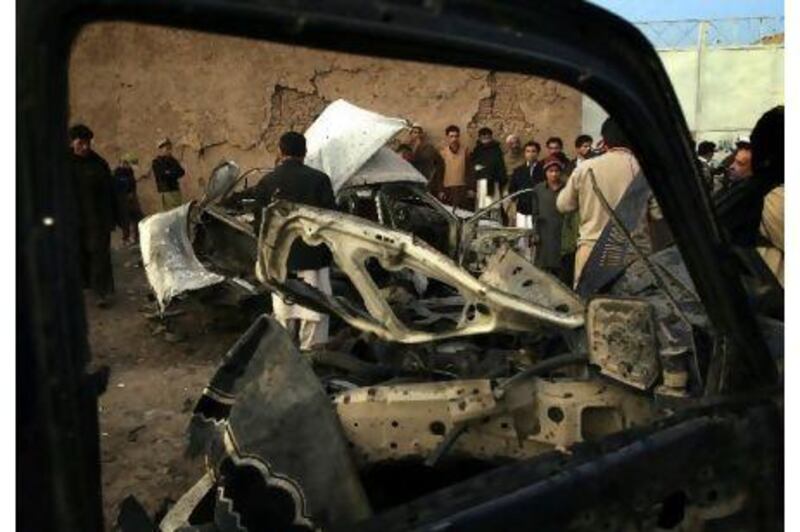KABUL // As the United States assesses the impact of its strategy for the war in Afghanistan and Pakistan, tribal leaders from a key border area say the security situation there has deteriorated horribly during the past 18 months.
The men from Khyber Agency paint a dire picture of life in the remote, impoverished region, which lies at the heart of a conflict now raging across the disputed and lawless frontier that separates the two countries.
Caught between the Washington-backed Pakistani armed forces and a growing insurgency, they claim thousands of civilians have been killed during and after fighting between the two sides.
Malik Hindustan Gul said: "The situation over there is very bad. They send their planes and helicopters, so we go to the mountains. Then when we come down al Qa'eda cut our heads off."
In a high-profile speech last December, the US president, Barack Obama, unveiled a strategy described as "the way forward in Afghanistan and Pakistan". It would, he announced, "bring this war to a successful conclusion".
One year on, the impact of that plan is now being assessed by the White House and the conclusions are expected to be announced later in the month.
Although the official verdict is likely to be cautiously optimistic, elders from one of the conflict's many front lines claim security has deteriorated markedly as a direct result of the fight being taken to members of the Taliban in their area.
Khyber Agency, in the Khyber Pakhtunkhwa province, is a vital crossing point from Pakistan into Afghanistan, and all parties in the war have shown they are desperate to bring it under their control.
This has led to the Taliban ambushing convoys transporting Nato supplies through the area, as well as carrying out a number of suicide attacks and gaining strength in the nearby city of Peshawar.
Meanwhile, government forces have launched ground and air offensives in an effort to stem the insurgency.
Speaking on a recent visit to Kabul, the elders said the relentless clashes are having a devastating effect.
Malik Ayoub Khan said: "One day the Taliban are doing operations over there, one day the government is doing operations over there."
According to Mr Khan and his colleagues, the rebels are thriving in Khyber Agency. Made up predominantly of local young men, they show little regard for the tribal leadership that has traditionally ruled the area, issuing threats to anyone who opposes them. Infrastructure including schools, roads, bridges and medical clinics have been among their targets.
"If we are 100 people, they are 1,000. How can we stand against them?" Mr Khan asked.
The border, having been drawn by the British to create a buffer zone between Afghanistan and British India proper, remains disputed even today. Pashtuns in both countries ordinarily consider themselves Afghans and the Taliban have exploited this to full effect, seeking sanctuary, winning support and intimidating the communities that live throughout the region.
However, the elders visiting Kabul were just as angry with government forces fighting the rebels. Under pressure from Washington to target militant bases, Islamabad has increasingly brought the war to Khyber Agency during the past year.
An air strike there in April killed about 70 civilians and led to an apology from Pakistan's chief of army staff, Gen Ashfaq Parvez Kayani. Similar incidents have killed scores of innocent people, prompting Mr Khan to say Mr Obama must help stop them.
That appears unlikely to happen anytime soon. As part of his strategy, the US president described the Taliban and al Qa'eda insurgency as a "cancer" that had "taken root in the border region", warning that "we cannot tolerate a safe haven for terrorists."
Since then, the number of CIA missile attacks by unmanned drones has significantly risen in north and south Waziristan, on the Pakistan side of the frontier.
Malik Hokam Khan, another tribal leader, claimed that around 5,000 civilians had been killed in Khyber Agency during the past 18 months. Among them were more than 70 people beheaded by the Taliban, including his cousin. Hundreds had died at the hands of the government, he added.
"The situation over there is very bad," he said, before accusing the US of failing to clearly show how it wanted an end to the war.
"A scenario like a film is going on in our land. When this film finishes, then we will have peace."





